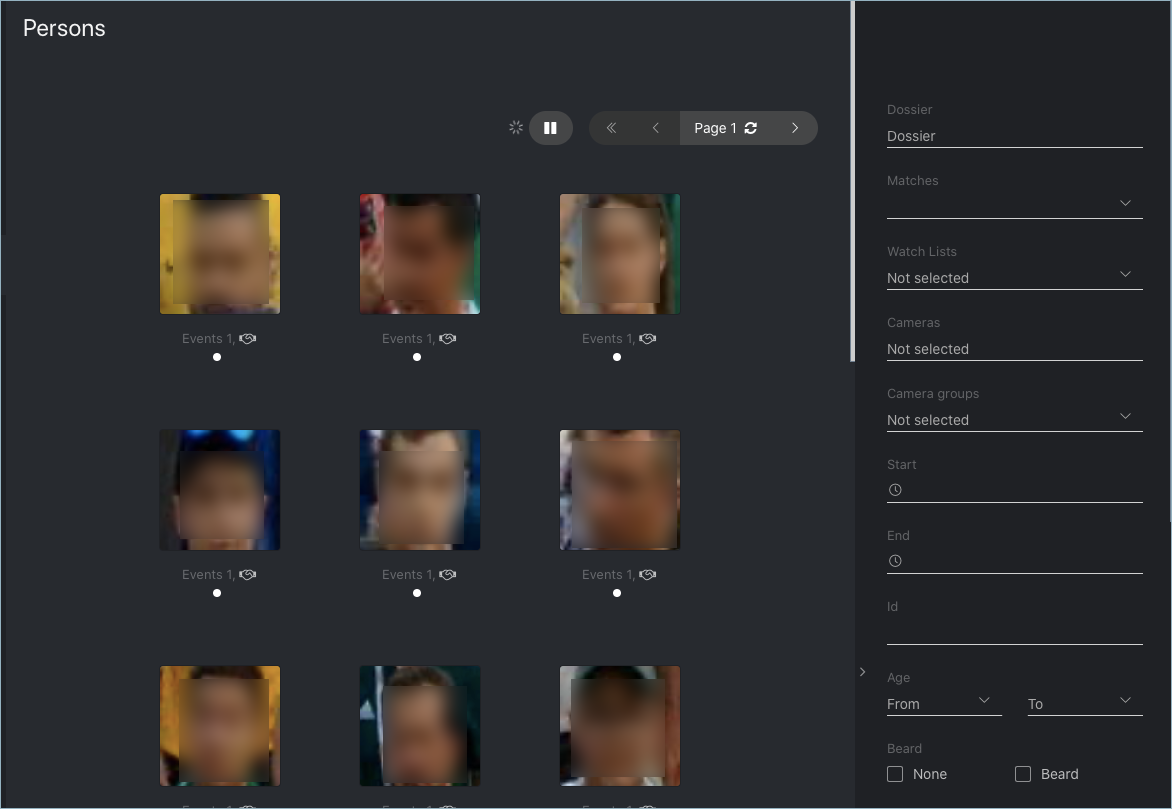Person Recognition
FindFace Multi allows for automatic person recognition. The system on-the-fly recognizes faces belonging to the same person and clusters them, building a person gallery. You can work with the person gallery on the Persons tab.
Note
In the person clusterization is enabled, the system databases will hold the person event entity linked to all episodes that feature a person’s face.
Important
By default, person clusterization is disabled. Enable and configure it via the /etc/findface-security/config.py configuration file.
In this section:
Clusterization Methods
FindFace Multi uses the following methods to cluster faces belonging to the same person:
Dynamic clusterization. The clusterization takes place on-the-fly after an episode is closed. The result of dynamic clusterization is shown in real-time on the Persons tab.
Note
The technical details are as follows. Not every episode is qualified: the number of events in it must be equal or greater than
PERSON_EVENT_MIN_EPISODE_EVENTS(set up via the/etc/findface-security/config.pyconfiguration file). If an episode meets this requirement, the system selects the best quality event and performs the following operations:Creates a new entity
PersonEventin the main system database PostgreSQL. The entity contains the event metadata, a link to the parent episode, face feature vector, and thumbnail.Searches for a similar face centroid in the
person_eventsgallery of the Tarantool feature vector database. A face centroid is a virtual feature vector averaged across all person’s faces that have been detected so far. If a similar centroid is found, the system updates it using the new event. Otherwise, it creates a new centroid.
Scheduled clusterization. We recommend scheduling it on late night hours as it takes up a lot of CPU resources and time.
Note
The schedule is defined in the RRULE format as
PERSONS_CLUSTERIZATION_SCHEDULEin the/etc/findface-security/config.pyconfiguration file. The rest of the technical implementation resembles the dynamic method. However, the face centroid quality is better in the scheduled method as centroids are averaged across a larger array of accumulated feature vectors.Important
The scheduled clusterization completely overwrites the person gallery, including ids.
Enable and Configure Person Clusterization
By default, person clusterization is disabled. To enable it, open the /etc/findface-security/config.py configuration file and modify the SERVICES section as such:
sudo vi /etc/findface-security/config.py
...
SERVICES = {
"ffsecurity": {
...
"persons": True,
}
...
You will see the Persons tab appear in the FindFace Multi web interface.
In the same configuration file, you can modify the following parameters:
PERSON_EVENT_MIN_QUALITY: minimum quality of faces used in person clusterization.PERSON_EVENT_MIN_EPISODE_EVENTS: minimum number of events in episodes used in person clusterization.PERSONS_CONFIDENCE_THRESHOLD: confidence threshold to match a face to a person.Warning
Consult with our experts by support@ntechlab.com before changing this parameter.
PERSONS_CLUSTERIZATION_SCHEDULE: recurrence rule (RRULE) for scheduling person clusterization.Tip
See the RRULE calculator here.
# -- Persons configuration --
# rrule (recurrence rule) for scheduling persons clusterization
# WARNING: all scheduling works with UTC time and NOT aware of any timezone
'PERSONS_CLUSTERIZATION_SCHEDULE': 'RRULE:FREQ=DAILY;INTERVAL=1;WKST=MO;BYHOUR=0;BYMINUTE=0',
# face to person matching confidence threshold
'PERSONS_CONFIDENCE_THRESHOLD': 0.739,
# minimum required face quality for person creation
'PERSON_EVENT_MIN_QUALITY': 0.45,
# minimum required number events in episode for person creation
'PERSON_EVENT_MIN_EPISODE_EVENTS': 1,
Work with Person Gallery
To see the person gallery, navigate to the Persons tab.
To work with the person gallery, use the following filters:
Dossier
Matches
Cameras
Camera groups
Watch lists
Time period
Person id
Face features (if enabled)
Liveness (if enabled)
